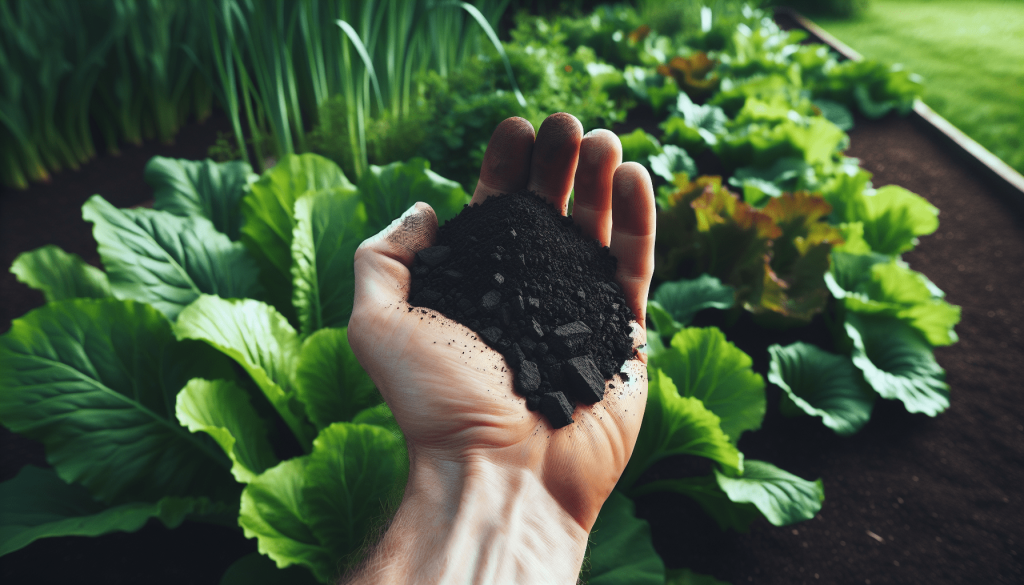This post may contain affiliate links. As an Amazon Associate, we may earn commissions from qualifying purchases.
Welcome to the wonderful world of biochar, a fantastic addition to your gardening toolkit! In “How Can I Use Biochar In My Garden To Improve Soil Health?”, you’ll discover the incredible benefits of incorporating this natural substance into your soil. You’ll learn how biochar can enhance soil structure, boost water retention, and stimulate vital microbial activity, all while being eco-friendly. This guide will walk you through the simple steps of integrating biochar into your garden, ensuring that your plants thrive and your soil remains healthy and vibrant. Have you ever wondered how you can improve the health of your garden soil and consequently see your plants thriving like never before? Well, if so, you might want to consider adding biochar to your garden. This black gold could be the solution you’ve been looking for to rejuvenate your garden. But what exactly is biochar, and how does it work? Let’s dive into this fascinating topic and explore how you can use biochar in your garden to improve soil health.

What is Biochar?
Biochar is a type of charcoal that is produced by heating organic material (such as wood, manure, or leaves) in a low-oxygen environment through a process called pyrolysis. This results in a stable, carbon-rich product that can be added to soil to improve its quality and fertility. Biochar has been used for centuries by indigenous peoples in the Amazon Basin who created rich, fertile soils known as Terra Preta.
The Science Behind Biochar
Biochar’s unique properties come from its structure. When organic material undergoes pyrolysis, it creates a porous structure that can hold nutrients and water. This makes it an excellent addition to your soil, offering several benefits.
Here is a simplified breakdown of the process:
| Step | Description |
|---|---|
| 1 | Organic material is collected (wood, manure, etc.) |
| 2 | The material is heated in a low-oxygen environment (pyrolysis) |
| 3 | Biochar is formed with a porous structure that can improve soil health |
Benefits of Biochar
Biochar offers numerous benefits that can significantly enhance soil health, which in turn promotes better plant growth. Here are some key advantages:
Improved Soil Structure
The porous nature of biochar helps to improve soil structure. It provides spaces for air and water, essential components for healthy root growth. Improved soil structure also enhances root penetration, making it easier for plants to access nutrients and water.
Increased Nutrient Retention
One of the standout features of biochar is its ability to retain nutrients. This means that the nutrients you add to your soil (through fertilizers or compost) are held in the soil for longer periods, making them available to plants over an extended period. This reduces the need for frequent fertilization.
Enhanced Water Retention
Biochar’s porous structure also allows it to hold water like a sponge. This is particularly beneficial in areas prone to drought or in sandy soils that drain quickly. By adding biochar to your garden, you can improve water retention, ensuring that your plants have a consistent supply of moisture.
Carbon Sequestration
By adding biochar to your soil, you are not only improving the health of your plants but also helping the environment. Biochar is stable and can lock carbon in the soil for hundreds to thousands of years. This makes it an effective tool for carbon sequestration, helping to reduce greenhouse gases in the atmosphere.
Enhanced Microbial Activity
The porous structure of biochar provides an ideal habitat for beneficial soil microorganisms. These microorganisms play a crucial role in breaking down organic matter, cycling nutrients, and promoting plant health. By adding biochar to your soil, you can foster a thriving microbial community.
How to Use Biochar in Your Garden
Now that you understand the benefits, let’s discuss how you can apply biochar in your garden to maximize its impact.
Sourcing Biochar
You can either purchase biochar from gardening stores or make it yourself if you have the necessary equipment. If you choose to buy, look for high-quality biochar that is free from contaminants.
Making Your Own Biochar
If you’d like to try making your own biochar, here’s a simple guide:
- Gather Materials: Collect organic waste such as dry wood, branches, and agricultural residues.
- Set Up a Kiln or Pit: You will need a metal drum or a pit where you can create an oxygen-limited environment.
- Pyrolysis: Ignite the organic material and let it burn in the low-oxygen environment until it turns into char.
- Cool Down: Once the material has transformed into biochar, let it cool, and then crush it into smaller pieces before use.
Here’s a simple table to summarize this:
| Materials | Equipment | Steps |
|---|---|---|
| Dry wood, branches | Metal drum or pit | Burn in low-oxygen environment until charred, cool down, and crush |
Pre-Treating Biochar
Before adding biochar to your garden, it’s beneficial to ‘charge’ or pre-treat it. Biochar on its own can initially draw nutrients away from plants because of its high cation exchange capacity (CEC). By mixing biochar with compost, manure, or fertilizer for a few weeks before incorporating it into the soil, you can pre-charge it with nutrients, ensuring it provides immediate benefits.
Applying Biochar
The amount of biochar to use depends on the specific needs of your soil and plants. A general recommendation is to use biochar at 5-10% of the soil volume. Here’s how you can apply it:
- Garden Beds: Mix biochar into the top 6-12 inches of soil in your garden beds.
- Potting Mix: For potted plants, incorporate biochar into your potting mix at a rate of 5-15% by volume.
- Lawn and Turf: For existing lawns, you can spread biochar on the surface and then water it well to help it penetrate the soil.
Potential Drawbacks and Considerations
While biochar offers numerous benefits, there are some potential drawbacks and considerations to keep in mind:
Initial Cost
High-quality biochar can be expensive to purchase. However, considering its long-term benefits, it may be a worthwhile investment.
Soil Testing
It’s a good idea to conduct a soil test before applying biochar. This will help you understand your soil’s current condition and tailor your biochar application accordingly.
Over-application
Although biochar is beneficial, more is not always better. Excessive application can potentially disrupt soil balance. Stick to recommended rates to avoid any adverse effects.
Compatibility with Other Soil Amendments
Biochar can be used in conjunction with other soil amendments like compost and mulch. However, it’s important to monitor your soil and plants to ensure that you are providing the right mix of nutrients and organic matter.

Real-Life Success Stories
To give you an idea of biochar’s impact, let’s look at a couple of real-life success stories:
Urban Garden in Chicago
An urban gardening project in Chicago incorporated biochar into their raised beds. They reported a noticeable improvement in soil structure and water retention. Plants were healthier, and yields increased by up to 20%.
Vineyard in California
A vineyard in California struggling with sandy, nutrient-poor soil added biochar to their vineyard. Over the course of two years, they saw a significant improvement in soil health and vine growth. The biochar helped retain water and nutrients in the soil, reducing irrigation needs and improving grape quality.
Conclusion
Using biochar in your garden can be a game-changer, offering numerous benefits that promote healthier soil and thriving plants. From improving soil structure to enhancing nutrient and water retention, biochar is a versatile and sustainable addition to any garden.
Remember to start with quality biochar, consider pre-treating it, and apply it at recommended rates to see the best results. With a little experimentation and perseverance, you’ll soon see your garden flourishing like never before.
So, are you ready to give biochar a try in your garden? Your plants—and the planet—will thank you!







